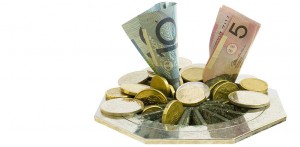Many years ago, I remember getting to the cash register with a trolley load of shopping.
I handed over my debit card, and the machine rejected my card. 
Oh far out – there wasn’t enough money in the account!
I thought there was more.
I had lost track of my income and expenses, and I was in hot water.
I felt my face turn completely red.
I’m not proud of this, but I ran.
I grabbed my useless debit card, and left the full trolley of food, and I hot-tailed it out of there.
Nothing like lack of money for shrouding you in shame.
That was a turning point for me.
My income had dropped, but my spending habits hadn’t changed.
Maybe you’ve been in the same boat at some stage?
Here’s how to you can get out of that situation, if you’re neck-deep in debts:
1) Find out where your money is going
The first step is to work out exactly what you have coming in, and what’s going out.
Approach this without judgement. Put on your private investigator’s hat, and delve deep.
There are some great tools to help you with this.
I used Quicken to track everything I spent for 3 months, down to the dollar.
If you don’t want to do it for that long, even 1 week of discipline will pay you dividends.
There are loads of other tools available these days though – and if you need a budget, you could try Mvelopes, GoodBudget or (funnily enough) You Need a Budget.
Or, simply grab all of your receipts and enter these into a spreadsheet, along with your statements – so you can get down and dirty with this, and work out your actual inflow and outflow of your money.
2) Have a think
Once you’ve worked out where you’re at, remember to include the obvious, as well as the unexpected costs such as:
- Gifts/donations
- Savings
- Pets
- Clothing
- Accommodation
- Entertainment
- Food
- Utilities
- Insurance
- Child care
- Debt payments
Compare how much money you have coming in, compared to how much is going out.
This is simpler to say than actually do.
Have a look at what percentage of your total spending each category represents.
Have a think about whether you’re comfortable with that.
Consider whether it reflects your values.
3) Make some changes
If you need to make some adjustments (and you probably do, because there’s always room for improvement), start looking for places to redirect spending from what you really don’t care about to what you do. 
If your discretionary expenses have been slashed, and you’re still in trouble, I’ll take a stab at this by saying your big bills are out of whack.
If your ‘must have’ expenses (i.e. your accommodation, food, insurance, utilities, loan payments and child care) are more than 50% of your after-tax income, you are likely to struggle.
It’s time to downgrade the car, or your accommodation, and examine where you can make some serious, hard-hitting changes.
Yes, I’m all for making more money, but I’m also a fan of being frugal and building up your trading equity, even if it means some short-term sacrifices.
I recently had a look at one of my trader’s money flow, and I couldn’t fault it.
How was it that he was still in a crisis situation financially?
Well… I’ll tell you. 
Every so often, to console himself about his life, he blew a big chunk of money on an unnecessary purchase.
He bought an antique sideboard here, and an expensive guitar there… and his overall life suffered because of it.
So beware of the big, periodic ‘spoil’ purchase as well, as set up some circuit breakers before you buy anything over a set amount e.g. $500.
If you’re serious about getting out of your financial funk, follow these three steps and you’ll pay down your debt, build your trading equity, and still enjoy a few of life’s comforts.

No comments:
Post a Comment